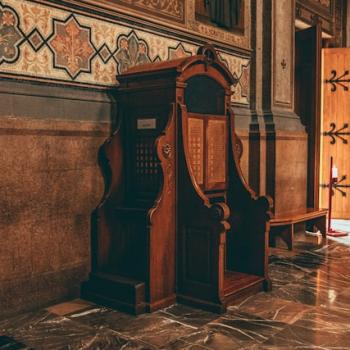
On April 15th, 2024, four people were injured at Christ the Good Shepherd Church in Wakeley, Australia. Among these was Assyrian Bishop Mar Mari Emmanuel, who suffered multiple stabbings.
The bishop at the time of writing is currently hospitalized and has undergone surgery for his wounds. The attacker, a 16-year old boy, is under arrest and is also hospitalized.
The stabbing of Bishop Mar Mari Emmanuel is a tragic story, and it is still unfolding. As someone who has been moved by his several of his sermons, I extend prayers and solidarity with the Assyrian community in Wakeley.
This column is devoted to thinking about the common life, life-with-others. It is about seeking the good of one’s city, good for all, rather than for some. Sometimes, seeking the common good or building up the common life can seem idealistic. It sounds good, but how do we actually preserve and uphold the life we share with our neighbors? Especially when that shared life turns antagonistic?
The story of Bishop Mar Mari shows that the common life, while a high ideal, is not easy. But through the suffering of the bishop and his fellow congregants, we find that the common life is not impossible.
In this article, we will ruminate on how we share life with others with different religions or ideologies which we might not see as saving or edifying. We will also discuss persecution: how do we respond to people who hurt us, and how do we discern between being rightly persecuted and wrongfully provoking another person?
I. Who is Bishop Mar Mari?
Bishop Mar Mari is currently part of the Church of the East, or more specifically, the Eastern Syriac Church. This church is different from Protestants (which includes evangelicals), Catholics (of which Roman Catholics make up the largest part), and Orthodox Christianity (a tradition as old as Catholicism, but not as geographically or theologically familiar to the average evangelical).
The Church of the East, a pretty vague term for most scholars of religion, broadly designates churches with some form of Nestorian theology. Nestorianism is a can of worms which we shall not get into here. You can open that can on this page at New Advent if you would like. A writer here on Patheos also wrote an interesting article sharing their experience with the Assyrian Church of the East.
The bishop in his sermons does not hold back any punches. This is part of the reason why he has accrued a large following on the internet, especially on YouTube and TikTok. He has sparked several controversies surrounding issues of sexuality, COVID-19, the United Nations, and Trump. But the controversies which are relevant here are his teachings about other religions.
There are plenty of videos of Emmanuel talking about other religions. Not all of what he says is cordial. Along with Roman Catholicism and Judaism, Emmanuel also talks about Islam quite a bit. On YouTube, you can find videos of his messages with titles like “Is the Quran Wrong?“, “Islam Debunked in 7 Minutes,” or “Islam vs. Christianity.”
The extent to which Emmanuel was intentionally provocative towards other religions and their adherents, is left to the especially curious reader to determine. But suffice it to say, it is not surprising that the boy who assaulted Bishop Mar Mari and the other churchgoers is a Muslim. After the assault, the boy said, “If he didn’t swear at my Prophet, I wouldn’t be here. If he didn’t involve himself in my religion, I wouldn’t be here.”
II. There are Wrong and Right Ways to be the Only Way
In the Bible, Jesus makes a highly scandalous declaration: “I am the way, and the truth, and the life. No one comes to the Father except through me” (John 14:6, ESV). It is a bold claim. But it is not a unique one.
As Scripture says, people tend to live life by doing what is right in their own eyes. The whole book of Judges is one long illustration of this. We might say that everyone is “the way” for themselves. So Christians are not unique when they say that their way is the only correct one. Even those who would say that there are many ways towards fulfillment or salvation would probably not see exclusive claims to truth as valid. Accepting all ways is a way in itself, too.
Nevertheless, we Christians still make a bold claim when we say, even in a qualified way, that Christ is the only way to the Father or to heaven. Bold, most definitely. But not always offensive or overbearing.
One must ask oneself, “Does being a witness for Christ mean ‘debunking’ or demeaning the religions and nonreligions of my neighbors?” Another way to put that question would be, “Are there ways that I can share Christ without having to discount the alternatives?”
See, there are right ways and wrong ways to believe that your way is the only true way. And this is an especially important lesson to learn when people harm us or demean us for the things we say.
III. Persecution and its Imitators
Before returning to the story of the bishop, we would benefit from pursuing this line of thought further. If there are right ways and wrong ways to be the only way, then there is a difference between being persecuted for what you believe, and other cases of suffering which resemble persecution.
Persecution, which is talked about quite a lot in the Bible, is suffering for what you believe in. It is the most intense form of witnessing to the truth. In fact, the word “martyr,” which usually refers to people who die for their faith, literally means “witness.” So in Christianity, we often think of bearing witness for the truth as something that you will suffer for. Therefore, many Christians believe that if you are suffering, it is proof that you are bearing witness to the truth correctly.
However, not all forms of suffering are persecution. An obvious illustration would be to mock someone’s accent, or insult their features. If that person responds vocally or physically, you can’t call that persecution. But let’s look at more interesting cases. Say that you are calling a very important prophet in someone else’s religion morally detestable and a deceiver, or that people who read a certain holy book are completely lacking in intelligence. Or, labelling a complete group of people sexually degenerate for being who they are. Sound familiar?
Aside from being accusations leveled against Christians throughout history, Christians say these things to other people! And when you suffer either from verbal or physical violence from those you hurt with these words, it is very questionable whether you are suffering persecution.
Persecution happens when you prioritize the message of Christ. Persecution won’t always happen, but when it happens, it results from sharing the Gospel. False persecution, on the other hand, happens when you seek suffering or provocation rather than bearing witness to Christ. A true witness for Christ does not seek out persecution, but welcomes it when it does occur. A false witness for Christ seeks out persecution so he can prove that he is what he is not.
IV. Our Response to Persecution
Whether you view Bishop Mar Mari Emmanuel as controversial or disagreeable, you must admit that his response to the boy who attacked him is admirable. But, I must stress strongly that Emmanuel was not without provocation. There were plenty of messages he gave that could position him as an active enemy of Islam. This would explain, but certainly would not excuse, the violence that he and his fellow Christians suffered.
Barring that very important consideration, his response was very Christlike. In response to the riots that erupted after the attack outside the church, he said,
I need you to act Christ-like. The Lord Jesus never taught us to fight. The Lord Jesus never taught us to retaliate. The Lord Jesus never said to us, ‘An eye for an eye and a tooth for a tooth’.
There are even claims going around that after being stabbed in the head and upper body, Emmanuel got back up, placed his hand on the teenager’s shoulder, and started praying for him.
The response to persecution should never be hatred or retribution. It should always be love. That does not mean that Christians are weak, as Andrew Tate has said. In a video response to the incident, Tate replies,
If Christians stood up, the Western world wouldn’t be failing in real time. I say this as a Muslim. All of the problems of the Western world [comes] down to an absolute lack of faith and conviction within the Christians.
This is a worldly response to persecution. Human nature inclines a person towards either fight or flight (or freeze). But God calls Christians to transcend what humans are naturally inclined to do.
V. Two Lessons for the Common Life
There are two things we can learn from the story of the bishop and the boy. First, the common life is not always going to be easy. Because of religious and political differences, people will not always be able to form healthy and peaceful relationships. There will always be tensions, resentment, envy, and even hatred between people. Those feelings will take shape in various ways.
So when we approach the life that we share with our neighbors, we cannot be too idealistic. But rather than being deterred from political life and seeing it as hopelessly conflictual, we should build skills to mitigate that conflict. We should believe that conflict and tensions can be resolved and redeemed. We must never become content with broken relationships in our cities and nations. Blessed are the peacemakers.
Second, we have a responsibility not to instigate those conflicts and divisions. The funny thing about Jesus is that He never focused on bashing other religions. He never talked about the innumerable deities of Rome or Greece. But He did focus on keeping those who knew God accountable. He was very critical of the Pharisees, and He held His disciples to a high standard. But again, Jesus did not polemicize other religions. He didn’t need to, because the Gospel speaks for itself.
We should be the same. There are ways to share the Gospel without tearing down other religious traditions. As much as we might like to, it will only worsen life in this world, creating unnecessary division and even violence. The Gospel is sufficient. There is no need for polemics.













